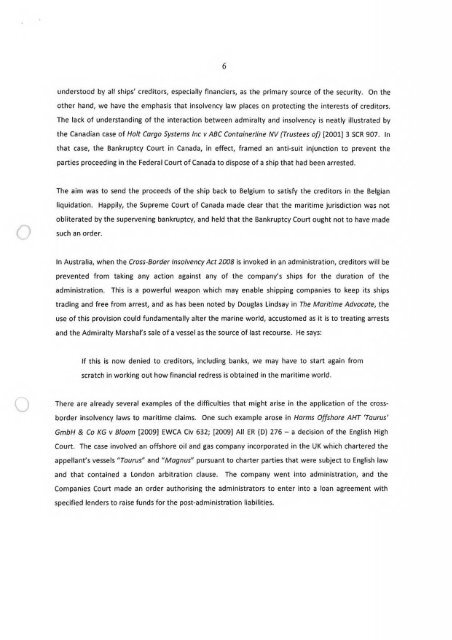COMITE MARITIME INTERNATIONAL
COMITE MARITIME INTERNATIONAL
COMITE MARITIME INTERNATIONAL
Create successful ePaper yourself
Turn your PDF publications into a flip-book with our unique Google optimized e-Paper software.
6understood by all ships' creditors, especially financiers, as the primary source of the security. On theother hand, we have the emphasis that insolvency law places on protecting the interests of creditors.The lack of understanding of the interaction between admiralty and insolvency is neatly illustrated bythe Canadian case of Holt Cargo Systems Inc v ABC Containerline NV (Trustees of) [2001) 3 SCR 907. Inthat case, the Bankruptcy Court in Canada, in effect, framed an anti-suit injunction to prevent theparties proceeding in the Federal Court of Canada to dispose of a ship that had been arrested.The aim was to send the proceeds of the ship back to Belgium to satisfy the creditors in the Belgianliquidation. Happily, the Supreme Court of Canada made clear that the maritime jurisdiction was notobliterated by the supervening bankruptcy, and held that the Bankruptcy Court ought not to have madesuch an order.In Australia, when the Cross-Border Insolvency Act 2008 is invoked in an administration, creditors will beprevented from taking any action against any of the company's ships for the duration of theadministration. This is a powerful weapon which may enable shipping companies to keep its shipstrading and free from arrest, and as has been noted by Douglas Lindsay in The Maritime Advocate, theuse of this provision could fundamentally alter the marine world, accustomed as it is to treating arrestsand the Admiralty Marshal's sale of a vessel as the source of last recourse. He says:If this is now denied to creditors, including banks, we may have to start again fromscratch in working out how financial redress is obtained in the maritime world.There are already several examples of the difficulties that might arise in the application of the crossborderinsolvency laws to maritime claims. One such example arose in Harms Offshore ANT 'Taurus'GmbH & Co KG v Bloom [2009) EWCA Civ 632; [2009) All ER (D) 276 — a decision of the English HighCourt. The case involved an offshore oil and gas company incorporated in the UK which chartered theappellant's vessels "Taurus" and "Magnus" pursuant to charter parties that were subject to English lawand that contained a London arbitration clause. The company went into administration, and theCompanies Court made an order authorising the administrators to enter into a loan agreement withspecified lenders to raise funds for the post-administration liabilities.
















